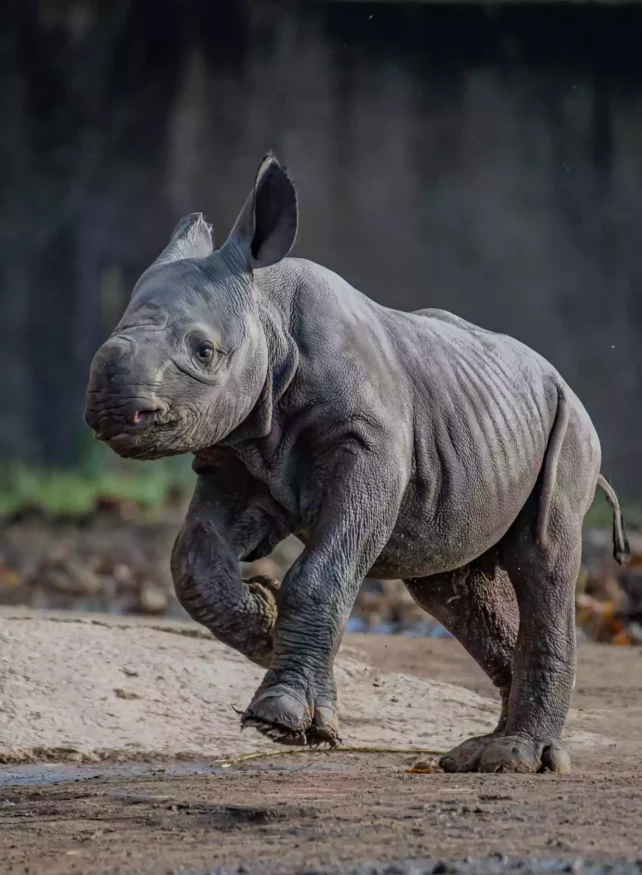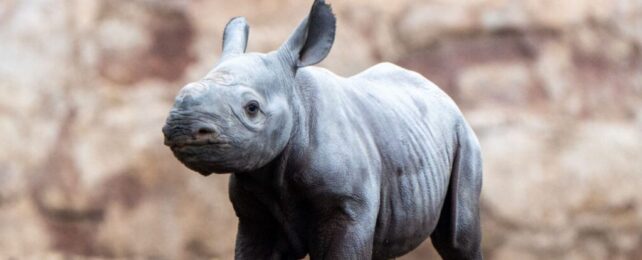One of the rarest mammals in the world, a black rhino, was just born in broad daylight at a zoo in England, and the footage is breathtaking.
For such a large newborn, the female calf landed on the soft, sandy floor of its enclosure with surprising aplomb.
In a recent press release, zookeepers at Chester Zoo in Cheshire, England said the calf has barely left her mother's side since she entered the world on Sunday, November 12.
"We'd been eagerly awaiting this birth for 15 long months and, as it's quite unusual for a rhino to give birth in daylight hours, we really didn't expect it to happen right in front of us as we were going about our day," says Chester Zoo's rhino team manager, Emma Evision.
"To witness the calf safely entering the world, in front of our very own eyes, was just the most incredible privilege."
The new rhino has not yet received a name, but her mother is called Zuri. Evison says the calf is healthy, well-fed, and "very inquisitive and full of energy".
Her species as a whole, however, is suffering. Black rhinos (Diceros bicornis) in Africa once used to number in the tens of thousands, and yet today, there are only around 6,500 individuals left in the wild.
Several subspecies have already gone extinct, and most of those that still exist are critically endangered due to ongoing poaching and habitat loss.

Only recently were eastern black rhinos (Diceros bicornis michaeli) pulled back from the brink of extinction.
This is the subspecies that Zuri and her calf belong to.
"Sadly this is a species that, for more than a century, has been hunted down and poached for its horn before being sold on the illegal wildlife markets," says Evison.
"This precious newborn's arrival is another positive step in safeguarding the species, which is what the endangered species breeding programme in European conservation zoos that we're a leading part of is striving to do."
Experts at Chester Zoo have been breeding black rhinos for years now, in a cooperative attempt with other European zoos to maintain a genetically healthy population of black rhinos in Africa.
One of the tricks to Chester Zoo's success is the careful monitoring of reproductive hormones in rhino dung. This is how the zookeepers figure out which males and females should date each other and when.
In 2019, officials at Chester Zoo helped facilitate an ambitious project that returned a large group of eastern black rhinos, bred at European zoos, to a national park in Rwanda.
Today, fewer than 600 eastern black rhinos are found across Kenya, Tanzania, and Rwanda. While these populations seem to be slowly increasing after the implementation of intense protection measures, time is not on the species' side.
Each black rhino mother can have just one calf at a time and their gestation period, or pregnancy, lasts for up to 16 months.
As poaching and habitat loss continues, some scientists think captive breeding programs are crucial for the species' continued survival.
"Zuri and her new arrival is testament to the unwavering dedication of conservationists here at Chester, and around the world, who are working to safeguard these incredible animals and ensure that they thrive long into the future," says Mike Jordan, the director of animals and plants at Chester Zoo.
Even in the face of so much tragedy, it's hard not to feel hopeful when watching Zuri and her calf trotting along, side by side.
